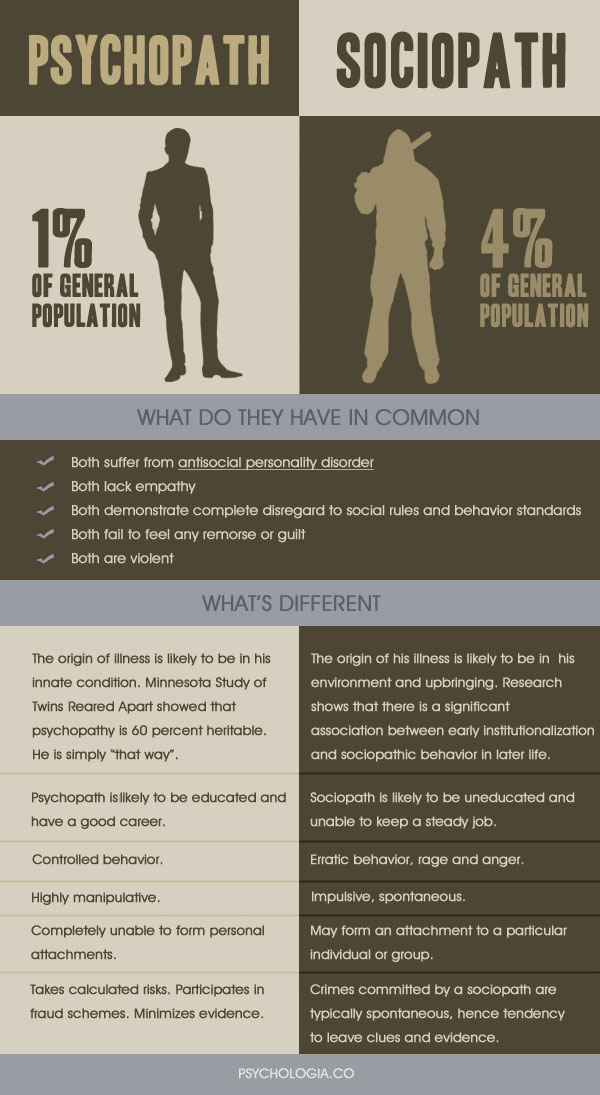A more precise term for a disorder characterized by an unethical and deviant behavior that affects the victim's relationships to others. A person with sociopathic personality has a deep need for power and disregard for human life. A person with sociopathic personality disorder is often involved in criminal activities such as theft, fraud, deception, sexual harassment, intimidation, blackmailing and stalking.
In medical terms, sociopaths is known as an antisocial personality disorder (ASPD). Sociopaths tend to be violent and reckless in their actions. They tend to disregard norms and ethical considerations that could lead to failure of their criminal actions. A person with this personality disorder lacks concern for other people's welfare and lacks moral obligations towards them.
This disorder is based on psychodynamic explanation. This explains that the mind has a hierarchy of rational cognitive and emotional processes. The lower levels of rational processes are referred to as the cognitive processes or the ego. According to this theory, the lower levels of rational processes are responsible for rational thought processes such as planning, rationalizing and planning. When the cognitive processes reach a level called the ego, then the individual loses control and begins behaving out of ego.
According to the psychodynamic theory, a person with this personality disorder has an irrational system or structure in place in his psyche. This irrational system or structure is made up of his beliefs and perceptions that can help him control his feelings and behavior. It also contains a set of distorted or non-functional beliefs that are responsible for the non-acceptance of others and the lack of empathy. Because of this system, the individual cannot perceive his own behaviors or the behaviors of others. As a result, he cannot be held accountable for his behaviors.
Another common characteristic of people with sociopathy is being impulsive
They often engage in risky behavior without much consideration. They make poor choices and often do things that they will regret later. They tend to be unthinking and not take time to think about the consequences of their actions.
According to the diagnostic criteria of Social Security Board, this disorder is classified under personality disorders or social maladjustment. It is not as serious as other personality disorders but if left untreated, this disorder can cause significant problems in relationships, employment, schooling, professional and personal relationships.

In general, a person with this disorder is emotionally immature. and lacks empathy for other people
He is suspicious of almost everyone and thinks that being associated with him. He feels no guilt for his actions. Although this personality disorder is not dangerous, it can become dangerous when he does not receive treatment.
Sociopathy can also cause problems if left untreated and in a situation where he is involved in criminal activity. Psychologists believe that a patient with sociopathic personality disorder may have problems in relationships because he is impulsive and tends to be irresponsible and if left untreated, may not be able to form long term and healthy relationships.
The most common problem related to this disorder is that a person with this personality disorder often becomes violent towards others, especially those whom he perceives as enemies. He also uses violence to intimidate other people, such as his co-workers, his spouse, friends, neighbors, and employers.
According to experts, this personality disorder is also believed to be hereditary, as it is believed to be inherited in a family. If one member of a family has the disorder, then it is likely to be passed on to all members. However, there is no definite evidence to prove this.
Emotional affairs are believed to be related to this disorder. A married couple is more likely to become involved in this type of relationship, although it is not known how much of an influence the emotional attachment has on this condition.
Cognitive behavioral therapy is used to treat this disorder by teaching the patient to develop a healthier way of thinking and behaving, as well as learn how to monitor his emotions and behavior. Other methods used include biofeedback therapy to help with the emotional adjustment of this disorder.